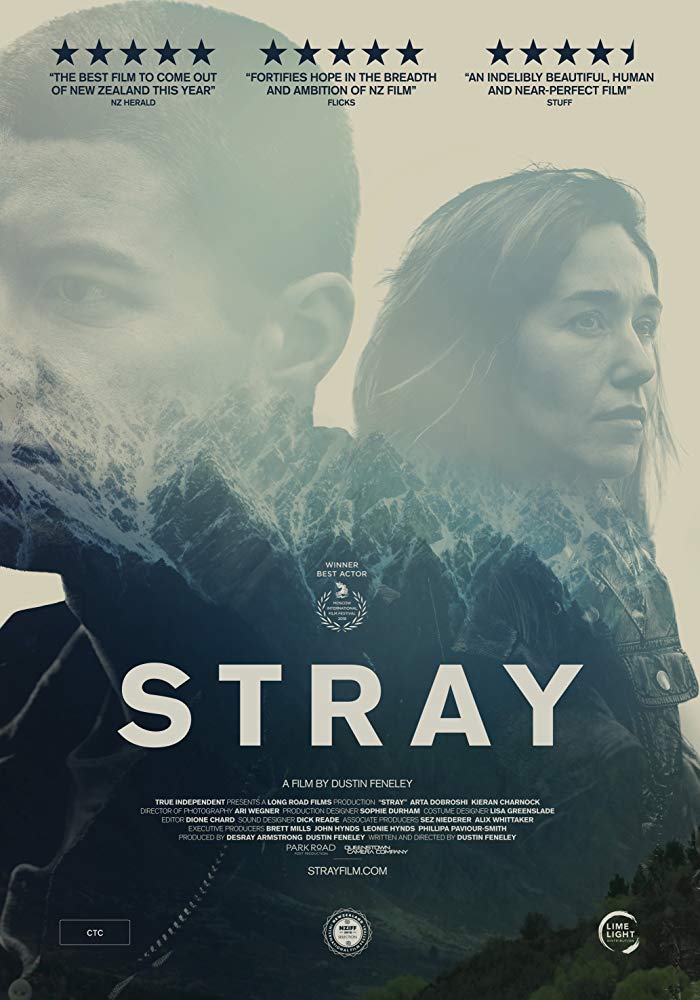 Stray (Dustin Feneley, 2018) wr. Dustin Feneley; Kieran Charnock, Arta Dobroshi, Luciane Buchanan, NZ; released 4 October; 104 min.
Stray (Dustin Feneley, 2018) wr. Dustin Feneley; Kieran Charnock, Arta Dobroshi, Luciane Buchanan, NZ; released 4 October; 104 min.
Australasian Cinema > films > Stray
 Stray (Dustin Feneley, 2018) wr. Dustin Feneley; Kieran Charnock, Arta Dobroshi, Luciane Buchanan, NZ; released 4 October; 104 min.
Stray (Dustin Feneley, 2018) wr. Dustin Feneley; Kieran Charnock, Arta Dobroshi, Luciane Buchanan, NZ; released 4 October; 104 min.
In a cold and remote landscape, two strangers struggle to repair their broken pasts. A young man is on parole after serving time for attempting to murder the man who killed his girlfriend in a hit and run. A woman is released from a psychiatric facility far from her homeland. These two damaged strangers cross paths in the mountains in winter and fall into a complex intimate relationship, putting to the test their capacity to trust and heal.
I wanted to see this film, and bought the DVD, because of Tim Wong's note (below) about the 'Man Alone tradition'. There is as yet no film of John Mulgan's great novel of 1939. I live in hope.
Striking, unusual aspects of this film are the length of the takes, the almost absence of music, and obtrusive location sounds such as footsteps.
I had better make clear that tho I think the sound recording is too noticeable, it's partly because most of the film is so quiet. That's a good thing, together with the shot-lengths, as it gives the viewer a great deal of time for empathy. I should also mention the lack of continuity shot-reverse-shot editing. Many dialogues are represented with only one side of the exchange being shown. Another good thing, as the viewer, again, is required to empathise with the character shown rather than be presented with Hollywood-style egalitarian editing that invites an interest in both speakers.
The narrative structure is unusual in that there are (almost) only the two central characters but they don't come together until about the 57th minute of the film - which later ends with them both in their separate lives.
I guess, if there is such a thing as a 'Man Alone tradition' - which later could have been called existentialist - that this film is legitimated by the existence of that philosophy.
Amanda Robinson:
These poetic details are ever enriched by Sophie Durham’s expert production design and the phenomenal eye of cinematographer Ari Wegner. Natural light and soft shadows are expertly diffused to conjure winter’s aching fatigue. Fogged windows, crisp duvets, and worn leather dining chairs build on the film’s naturalistic tactility.
Carefully considering the relationship between masculinity and situation, New Zealand film history echoes throughout Stray. And yet, the perceptive contours shaped throughout the film truly do constitute a breath of fresh air. Amanda Robinson, flicks.co.nz.
Tim Wong:
There’s a deliberate – in the context of the short history of our national cinema even daring – aesthetic discipline to this film, whose suppressed emotions lend greater power to its visuals. Ari Wegner, the talented DP behind Lady Macbeth’s intense painterly compositions, does astonishing things with darkness and diffused natural light. Within these stunning images, the Man Alone tradition is alive and well, but it’s also crisply refocused through Feneley’s commitment to stark silences and bold cinematic spaces into a kind of hard-edged New Zealand poetry. Tim Wong.
Jeremy Quinn:
Stray has a kind of hypnotic effect, which may alter depending on how much you relate to the story and its characters, but there’s a neat streak of very subtle humour to keep you grounded and attentive throughout.
It also manages to transcend its New Zealand setting, feeling like a universal tale that could be transported anywhere, boding well for its international appeal. Jeremy Quinn, Otago Daily Times.
I am very grateful to Dustin Feneley for replying to a couple of my notes to him with clarifications and corrections to mistakes I had made in the notes above.
Wikipedia page for Dustin Feneley (born Sydney 1982, dual Oz/NZ citizen)
Director's page for the film; his bio.
Page for the film's promotion
IMDb page
Reid, Ian 1979, Fiction and the Great Depression: Australia and New Zealand 1930-1950, Edward Arnold, Melbourne. He discusses John Mulgan's novel Man Alone.
Garry Gillard | New: 9 April, 2019 | Now: 6 December, 2020